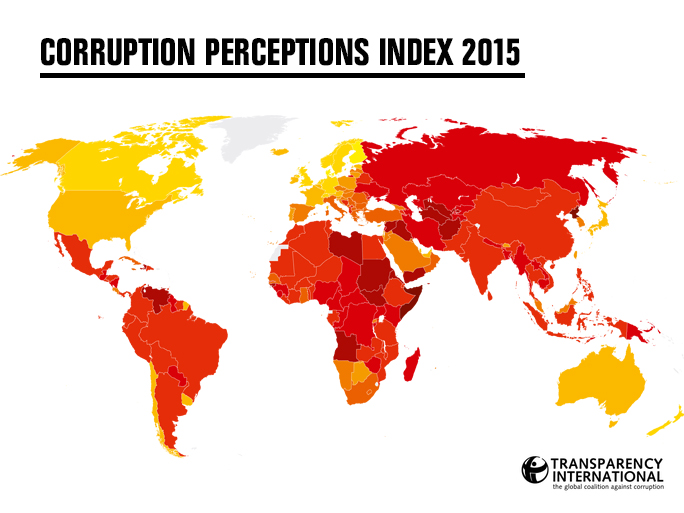Corruption Perceptions Index (CPI) 2015
Posted by: admin | Posted on: Январь 27, 2016 The Transparency International national chapter in Azerbaijan presents the TI Corruption Perceptions Index 2015. This year Azerbaijan received a score of 29, and was ranked 119th out of 168 countries. The CPI 2015 is presented on a scale of 0 to 100 with 0 being very corrupt and 100 being very clean. In 2014 the country was ranked 126th among 175 countries with the score of 29. Altogether 12 data sources were used to construct the Corruption Perceptions Index 2014. Data for Azerbaijan was drawn from 6 different sources.
The Transparency International national chapter in Azerbaijan presents the TI Corruption Perceptions Index 2015. This year Azerbaijan received a score of 29, and was ranked 119th out of 168 countries. The CPI 2015 is presented on a scale of 0 to 100 with 0 being very corrupt and 100 being very clean. In 2014 the country was ranked 126th among 175 countries with the score of 29. Altogether 12 data sources were used to construct the Corruption Perceptions Index 2014. Data for Azerbaijan was drawn from 6 different sources.
Azerbaijan’s performance as seen from the country’ score in this year’s CPI remained the same as in the previous year. Overall, recent years’ modest upturn in the country’s ranking was made possible by successful operation of corruption free ASAN centers, a single window agency that streamlined delivery of public services; as well as upgraded e-government that minimizes direct contact between officials and their customers. All of these changes indirectly contributed to the increase in the country’s CPI ranking. On the other hand, Azerbaijan’s position dropped in the Nations in Transit 2015 report published by Freedom House, which is one of the reference sources for the CPI. The global oil price slump negatively impacted the country’s economic performance, aggravating economic disparity. Mishandled currency devaluations and problems with transparency in the banking sector also undermined economic welfare. Altogether these developments resulted in the unchanged score of the country in the CPI.
Since 1995 the CPI has been a flagship product for TI. The ranking of countries in the Index is delivered in terms of the degree to which corruption is perceived to exist in the public sector and it is not a verdict on the corruption of nations or societies as a whole.
A number of important measures have recently been taken in Azerbaijan to combat corruption, such as simplification of licensing procedures and reduction of the scope of licensed activities; simplifying eligibility procedures for disability status and introduction of online tools for registration for social insurance; development of single standards for government hotlines; creation of a single internal e-system to follow up citizens’ application addressed to local executive powers, etc.
Corruption is still entrenched in the Azerbaijan society and the government needs to improve law enforcement procedures to ensure that the anti-corruption legislation works. Measures should be taken to ensure the protection of people wishing to report cases of corruption; also adoption of the Civil Service Code shall be expedited. Furthermore, serious efforts are required to improve transparency and accountability in public budget expenditure and public procurement; further reforms are required to improve property rights, including application of a simplified taxation on sales of land and bringing in line with the new rules on taxation of constructions; rules regulating customs’ clearance and enforcement thereof shall be overhauled. Also, a special focus shall be made on upgrade of e-application to e-services delivery.
The display of political will by the Azerbaijan Government to curb corruption leaves room for optimism, as this is an indispensable prerequisite for effectiveness of reform efforts. Another substantial ingredient in the struggle against corruption is the cooperation among all relevant stakeholders. Current economic challenge can be well turned into a unique development opportunity through vigorous economic and governance reforms. It is encouraging to see that the process has been launched but it will take time and effort and will have to be done in transparent, accountable and participatory manner. In this regard it is vital that the environment for the civil society be improved: broad consultations with all stakeholders shall be arranged prior to adoption of the draft laws of social significance to ensure that the laws are sustainable and implementable in practice.
2015 showed that people working together can succeed in the battle against corruption. Although corruption is still rife globally, more countries over the globe improved their scores in the 2015 edition of Transparency International’s Corruption Perceptions Index than declined.
CPI 2015 Press Release
CPI 2015 FA Q&A
GLobal Ranking Table CPI 2015

.jpg)
.jpg)
.jpg)
.jpg)
.jpg)
.jpg)
.jpg)
.jpg)
.jpg)
.jpg)
.jpg)
.jpg)
 D5 Creation
D5 Creation
Comments are Closed